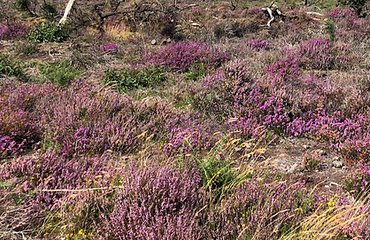

This database details the fire adaptive traits (traits that benefit the plant under recurrent fires) of plant species from UK heaths and mires. We aim for this to provide a valuable resource for researchers and ecosystem managers.
We view the traits of plants through the lens of fire, to provide an understanding the resilience and fitness of species against wildfire, or prescribed fires. By highlighting how species can benefit or be reliant on fire, we hope this database provides a starting point for helping to maintain these species and their long-term health.
About the Database
How to use the database
Plant species are organised into three major groups: Angiosperms, Gymnosperms, and Non-vascular plants (listed in separate sections of the website). Within each group, species are listed alphabetically by their respective families.
Next to each species is a visual summary of its fire-adaptive traits. In this chart:
-
Green indicates the trait is present (Yes)
-
Red indicates the trait is absent (No)
-
Clear/colourless indicates the trait is Unknown or Uncertain
For example, in the image to the right:
-
The species does NOT resist fire
-
DOES persist through resprouting
-
Does NOT persist via an on-site seedbank
-
Persists via an off-site seedbank is UNCERTAIN

Citation Request:
If you use the data provided on this website, please cite the following publication:
